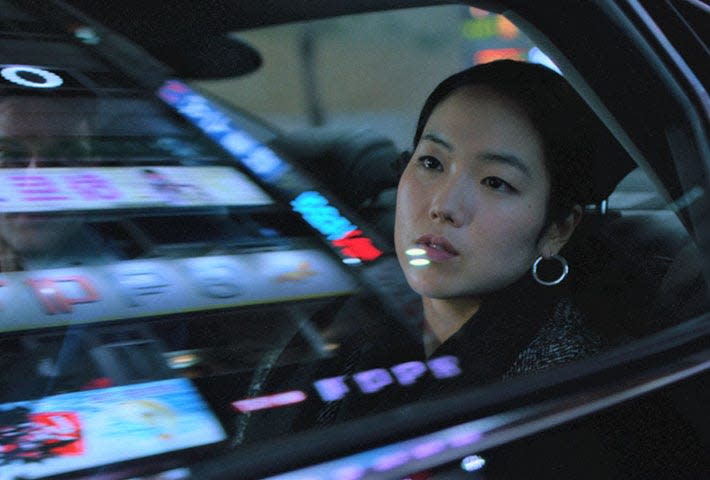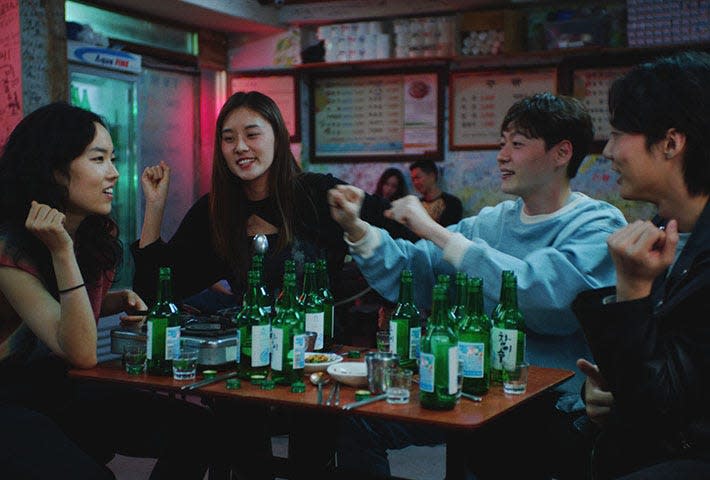Indie drama 'Return to Seoul' asks what we ever really know about ourselves

- Oops!Something went wrong.Please try again later.
Who are we really?
Are our personalities defined by our surroundings? Or by the experiences that happen to us at a young age? Is our outward existence something we can will? These are the questions found in Davy Chou’s “Return to Seoul,” a 2022 Cannes Film Festival standout premiering at Ragtag Cinema this Friday.
It is a gorgeously-shot journey of self-discovery. Or self-invention, depending on where you land on the film’s story. Either way, "Return to Seoul" is a fascinating character study with universal themes any audience member can appreciate.
Freddie (Ji-Min Park) was born in South Korea, but adopted at a young age by a French couple. Her name is short for Frédérique. She was raised in the European countryside but finds herself in Seoul when a trip to Japan is diverted. Although I later found myself doubting that story, even if it was a subconscious act on the character’s part.
More: Regal moviehouses, including Columbia's Stadium 14, deserve investment and TLC
Anyway, she ends up bonding with a hotel clerk and they hit the town where Freddie immediately commandeers an entire bar to makes it a personal party. These opening moments have a quirkiness that reminded me of a Jim Jarmusch film. But this light mood belies critical observations. Freddie asks her new friends if they know what “sight reading” is. They don’t.
“You have to able to analyze the music in one glance, evaluate the danger by reading the red flags, and jump in.” Yes, this line of dialogue is a key to understanding the movie and critical to appreciating the final scenes.
Because after the impromptu party, where she maintains she has no interest in learning about her biological family, Freddie searches out the adoption agency and inquires about her parents. Correspondence is sent out. Telegram, no less!
Dad (Oh Kwang-rok) responds and the reunification is awkward and extended. He’s the type of guy who lets his emotions get the best of him when he drinks. Which, seemingly, is all the time. Freddie could be accused of the same thing now that I think about it.
Mom doesn't respond to repeated attempts. While this isn’t outwardly addressed by Park’s performance, it does influence the character’s actions in more surprising ways.
Then “Return to Seoul” moves ahead a few years. Freddie has not returned to France but chosen to stay in South Korea. Her look is different. The attitude has adjusted. She meets a man who says he is an arms dealer. At first, I thought this was role playing. Slowly, we realize it is not.
Now, all of a sudden, Freddie is thrust into a new orbit. Which corresponds with Freddie seemingly adopting a whole new persona.
Dad still shows up from time to time. Mom still fails to respond to those written requests.
The film follows Freddie forward in time another few years. Every time “Return to Seoul” leaps ahead, other things about Freddie change. It is interesting to ponder how much of these shifts deal with the psychological and emotional complexities of being adopted versus the general uneasiness of someone young dealing with their origins and what they mean as they get older.

I cannot speak to the experience of being adopted, but “Return to Seoul” made me think about the subject in ways I had not quite grasped before. That it isn’t much different than trying to figure out your place in your family or how your environment growing up turned you into the adult you are. This is certainly something I think about all the time.
“Return to Seoul” isn’t necessarily about adoption at all, but rather about the search for one’s self. People in their twenties think of relocation as a way of redefining themselves. Or of being in a relationship — or rejecting relationships — as a personality trait. Even the act of changing one’s style of clothes or hair is a way of informing others that, yes, I am not so easily pigeonholed.
The fact that Freddie never quite figures herself out even in the film’s final moments might frustrate some but seems perfectly natural from a character perspective. Do any of us really figure out anything about ourselves in life?
More: April brings the funny with string of comedy dates at The Blue Note
From my research, I learned Chou is French-born but of Cambodian descent. His family fled the country before the crush of the Khmer Rouge regime. In fact, his film-producing grandfather disappeared during this brutal period. The director returned to the country in his mid-twenties and made two films there.
While the stories are not the same, the director’s real journey and Freddie’s experience in “Return to Seoul” have similar resonance and that’s felt by the audience in a powerful way.
James Owen is the Tribune’s film columnist. In real life, he is a lawyer and executive director of energy policy group Renew Missouri. A graduate of Drury University and the University of Kansas, he created Filmsnobs.com, where he co-hosts a podcast. He enjoyed an extended stint as an on-air film critic for KY3, the NBC affiliate in Springfield, and now regularly guests on Columbia radio station KFRU.
This article originally appeared on Columbia Daily Tribune: Cannes standout 'Return to Seoul' asks what we really know about ourselves

